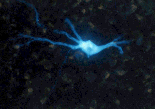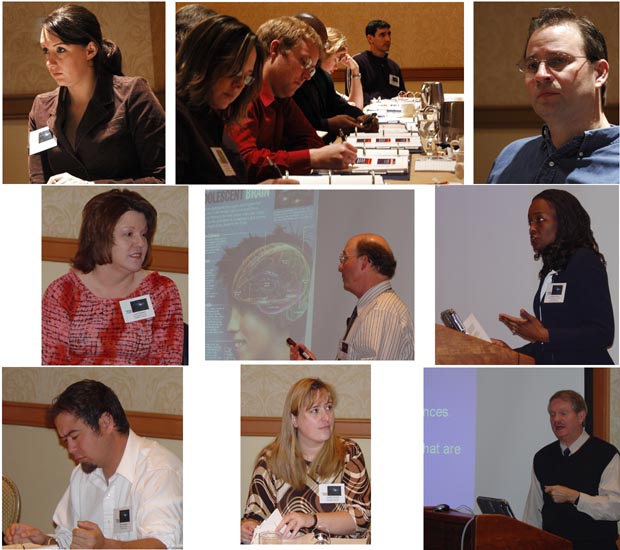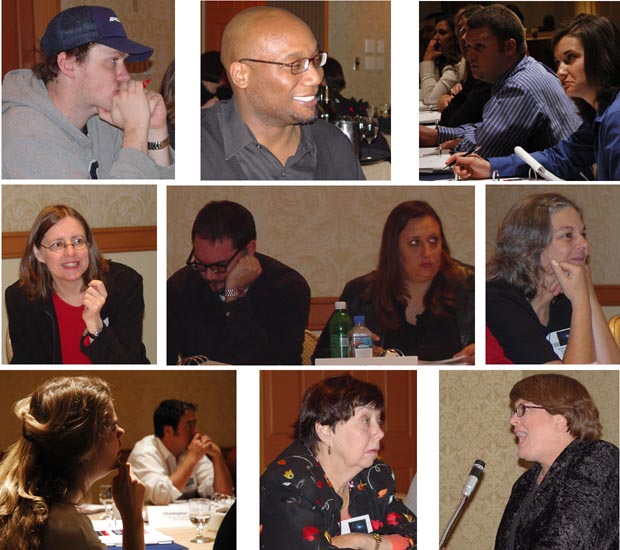Mark Boxley
Portage Daily Register
Portage, Wisconsin
Emily
Burton
Kentucky New Era
Hopkinsville, Kentucky
Nathan
Comp
Coreweekly
Madison, Wisconsin
Christopher
Emery
Philip Merrill College of Journalism
Silver Spring, Maryland
Stan
Finger
Wichita Eagle
Wichita, Kansas
Michael
Frazier
Newsday
Melville, New York
Dave
Gustafson
Charleston Gazette
Charleston, West Virginia
JoAnn
Kawell
Freelance Journalist
New York, New York
Anthony
Lane
Casper Star Tribune
Casper, Wyoming
Mandy
Locke
News & Observer
Raleigh, North Carolina
|
|
Rosemary Parker
Kalamazoo Gazette
Kalamazoo, Michigan
Lisa
Patterson
The Daily World
Aberdeen, Washington
Julie
Rehmeyer
Monterey Herald
Santa Cruz, California
Lisa
Rogers
The Gadsden Times
Gadsden, Alabama
Heidi
Rowley
The Tucson Citizen
Tucson, Arizona
Eric
Sagara
The Tucson Citizen
Tucson, Arizona
Judith
Tackett
The Nashville City Paper
Nashville, Tennessee
Jonathan
Tressler
The News-Herald
Willoughby, Ohio
Renee
Winkler
Courier-Post
Cherry Hill, New Jersey
|
On the history of addiction in America:
"Tracking history of drug use was extremely helpful - helps us recognize
that addiction isn't an illness of the 1960's and 1970's."
"Great overview. Gave me new info that tied into other presentations."
On
the introduction to pharmacological terms:
"Essential information in an easy to comprehend presentation."
"Extremely informative and helpful."
On
animal models of addiciton:
"Thanks for making your presentation informative and fun. Great
job!"
"Very interesting and compelling presentation. Could use more info
regarding current tests being done."
On
evaluating treatment:
"Tons of great story ideas. Talented speaker who relates well with
audience and offers terrific current info."
"He raised some good 'thought-provoking' questions about treatment."
On
the neurobiology of addiction:
"Clear, detailed, helpful."
"Very informative and educational. Easy to understand."
On
the principles of treatment:
"One of my favorites so far. I believe Dr. Miotto's connection
with those with addictions and her experiences gives her credibility
in the 'real world.'"
On
the personal side of addiction:
"She's an inspiration and tied in all the theoretical presentations
and gave it the needed human approach."
"Very emotional - brought the issue to a real, human level."
On
alcohol and the adolescent brain:
"Very interesting and entertaining. This really helped me understand
how addiction can seriously hurt kids/teens as opposed to adults."
"It was a great presentation and good information about adolescent
brain."
On
evaluating prevention of substance abuse:
"Good job of putting it in "English" for us!"
"Practical application of prevention on a local level."
On
treating the offender population:
"Very good, I liked it a lot. It was very informative."
"I found this presentation to be more of what my expectations about
the conference was."
|
|
On
screening for parental alcoholism:
"Very interesting information - good story ideas!"
Overall
impressions:
"Very interesting information. Some of it was a little technical.
But, really, well done."
"I enjoyed learning more about the biology and chemistry of drug
addiction."
"Some great speakers who know info inside and out."
"It was great! If there could be more ways to put a human face
on some of these issues, it would be even better."
How
participants think the workshop will help them with their reporting
on substance abuse:
"Understanding the biology will make more insightful, compelling
narratives."
"The length of our articles (500 word-average) limits the actual
content. However, the increase of understanding will greatly affect
the questions I ask."
"This has simplified a lot of the medical terminology and has helped
point toward questions that should be asked."
"I have come away with story ideas - and just as importantly, contacts
to discuss issues with or track down data from."
"The resources and contacts are invaluable. The networking also
promises to be fruitful."
"Background info always makes me more informed when interviewing,
especially people in the medical community."
What
participants liked most about the workshop:
"Biological info on addiction. Overall, well organized."
"Small groups, chance to talk to presenters in informal settings
like meals, material resources (binders, etc.)."
"The question and answer sessions were sometimes more informative
than the Power Point presentations. That is key."
"Meeting and exchanging thoughts and ideas with fellow journalists
from around the country."
"Data and websites on addiction; the presentation on animal addiction;
the development of teen brain and the alcohol rates. I also liked very
much the history piece at the beginning (I'd even suggest expanding
that - it helps put things in perspective)."
|
David Friedman, Ph.D.
Director, Addiction Studies Program for Journalists
Professor
Department of Physiology and Pharmacology
Wake Forest University School of Medicine
Winston-Salem, North Carolina Sue
Rusche
Co-Director
Addiction Studies Program for Journalists
Chairman, President, and CEO
National Families in Action
Atlanta, Georgia
A.
Tom McLellan, Ph.D.
Director, Treatment Institute
University of Pennsylvania
Philadelphia, Pennsylvania
Dennis
Deck, PhD
RMC Research Corporation
Portland, Oregon
Douglas
B. Marlowe, J.D., Ph.D.
Director, Section on Criminal Justice Research
Treatment Research Institute
University of Pennsylvania
Philadelphia, Pennsylvania
Karen
A. Miotto, MD
Associate Clinical Professor/Associate Director
Department of Psychiatry and Biobehavioral Sciences - Addiction Medical
Services
Neuropsychiatric Institute
University of California – Los Angeles
Los Angeles, California
|
|
Harold D. Holder, Ph.D.
Senior Scientist
Prevention Research Center
Berkeley, California
Susan
Rook
Recovery Advocate
Faces and Voices of Recovery
Alexandria, Virginia
Jack
W. Strandhoy, Ph.D.
Professor
Wake Forest University School of Medicine
Department of Physiology and Pharmacology
Winston-Salem, North Carolina
Celeste
R. Wilson, MD
Center for Adolescent Substance Abuse Research
Children's Hospital Boston
Boston, Massachusetts
Ken
C. Winters, Ph.D.
Professor, Department of Psychiatry
Director, Center for the Adolescent Substance Abuse Research
University of Minnesota
Minneapolis, Minnesota
|
Monday, December 12
8:00
Welcome and Introductions
David Friedman and Sue Rusche
8:15
A History of Drug Abuse and Addiction in the U.S.
Sue Rusche
9:15
Introduction to Pharmacological Terms
Jack Strandhoy
9:45
Animal Models of Addiction
Jack Strandhoy
10:15
Break
10:30
Is Addiction Treatment Effective?
Tom McClellan
12:00
Lunch
1:00
The Neurobiology of Addiction
David Friedman
2:30
Break
2:45
The Treatment of Addiction
Karen Miotto
4:15
Evaluations
4:30
Adjourn
6:00
Reception
6:30
Dinner
Speaker - Susan Rook
|
|
Tuesday, December 13
8:15
Alcohol and the Adolescent Brain: Tastes Great, Less Functioning
Ken Winters
9:45
Break
10:00
Prevention of Substance Abuse: What Science Tells Us
Harold Holder
12:00
Lunch
1:00
Treating the Offender Population
Doug Marlowe
2:30
Parental Alcoholism: Parents' Perspectives About Being Screened
in the Pediatric Office Setting
Celeste Wilson
3:15
Medicare Coverage and Access to Publicly Funded Opiate Treatment:
Oregon's Experience
Dennis Deck
4:00
Break and Evaluations
4:30
Introduction to SAPRP Mentors
5:00
Adjourn |




